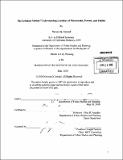The Lebanese schism? : understanding localities of microcredit, poverty, and politics
Author(s)
Jawaid, Naveen Q. (Naveen Qamar)
DownloadFull printable version (8.370Mb)
Alternative title
Understanding localities of microcredit, poverty, and politics
Other Contributors
Massachusetts Institute of Technology. Dept. of Urban Studies and Planning.
Advisor
Alice H. Amsden.
Terms of use
Metadata
Show full item recordAbstract
The widespread popularity of microfinance as a "win-win" solution to global poverty alleviation has significantly limited debate and dialogue around contesting viewpoints, program structures, and implementation norms. The present microcredit industry in Lebanon offers an authoritative space for practitioners to explore a differing microcredit model as implemented by a Hezbollah affiliated NGO, Al Qard Al Hassan Association. As one of the oldest and largest microcredit institutions in the Middle East, I argue that the perceived Lebanese schism allows us to explore the role in which organizational diversity has enabled a reinterpretation and an opportunity to revisit microcredit as a poverty alleviation tool in the context of the Southern Suburbs of Beirut. The country of Lebanon also offers a new locality in which development planners can explore how an NGO grassroots program, Al Majmoua, and how an institution, Hezbollah, that began as a grassroots political movement for the community and is now in many ways of the state, implement successful microcredit programs. Through the lens of Lebanese microcredit professionals and borrowers of the programs, this study explores how a hybrid narrative of microcredit has escaped industry isomorphism in Lebanon and how social capital has been created, managed, and reproduced.
Description
Thesis (M.C.P.)--Massachusetts Institute of Technology, Dept. of Urban Studies and Planning, 2010. Cataloged from PDF version of thesis. Includes bibliographical references (p. 110-115).
Date issued
2010Department
Massachusetts Institute of Technology. Department of Urban Studies and PlanningPublisher
Massachusetts Institute of Technology
Keywords
Urban Studies and Planning.